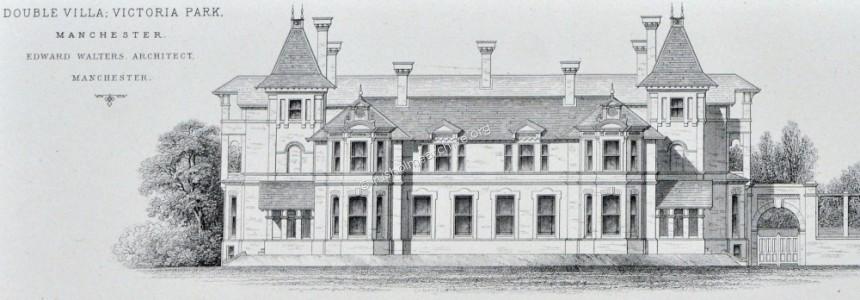Rusholme & Victoria Park Archive
History of Rusholme by William Royle, 1905 & 1914 edition in PDF format
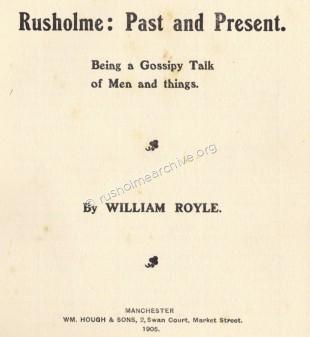
In March 1905 William Royle published his 'History of Rusholme' with the intriguing sub-title of 'Being a Gossipy Talk of Men & things'.
The content of the book was based on a lecture given by William Royle in the Rusholme Public Hall. An advertisement in the Manchester Guardian referred to the lecture as being given on March 9th at 7.30pm. The headline in the advertisement read, 'Platt Fields & Old Rusholme, A Gossipy talk of Men & Things' with 150 photographs of Old Rusholme and Rusholmites. Admission Free.
This first edition totalled 58 pages of which the last 10 pages are an appendix.
I presume that the book, printed by William Hough in Manchester was perhaps for for private circulation, I have yet to come across a copy that is priced, but most that I have seen usually have an inscription by William Royle as being a gift to a particular friend.
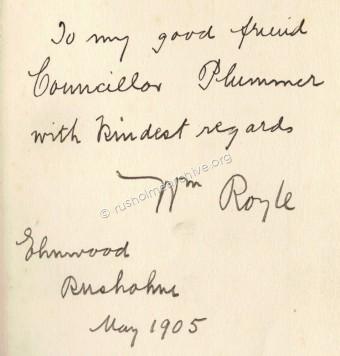
The photograph below is the cover title of the 1905 edition
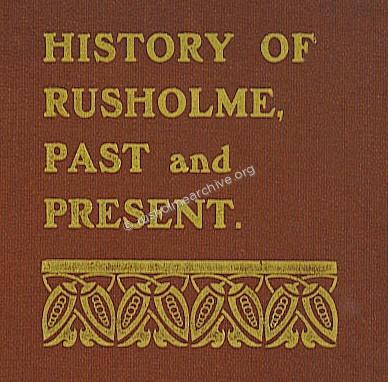
1914 Edition
In 1914 William Royle published a revised and rather more comprehensive version printed by William Morris in Manchester and containing a total of 86 pages, this includes a similar appendix but this edition also has an index.
What is particularly interesting about this extended version is that William Royle covers the period of 1906 with his account of the public agitation for the Manchester City Council to acquire Platt Fields as a public park.
This copy certainly was on sale to the general public, the price at five shillings, (25p), may well have put it beyond the reach of many of the poor of Rusholme that William Royle frequently refers to.
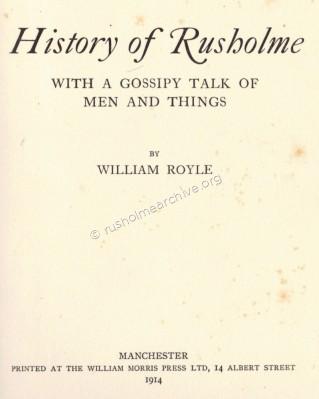
The photograph below is the cover title of the 1914 edition
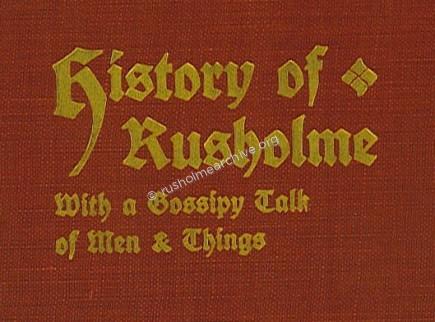
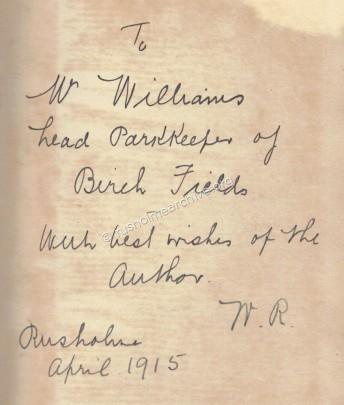
I have now scanned the 1905 version to a PDF file so that you can read a copy at your leisure. You will need the Adobe software to read the file but just click below and save the file to your computer.
The 1914 edition has now been scanned in one complete volume.
COPYRIGHT. I am confident that these two books can now be put into the public domain without infringing any copyright as the author died in 1923. If there is any person who feels that I am mistaken about the copyright of the books perhaps they will contact me. My final thought on this issue is that I am sure William Royle would be very pleased that his 'History of Rusholme' was freely available to be read by all.
The following biographical account of William Royle was a paper compiled by Harold Grayson in the summer of 1970 and read at a meeting of the Historical Section of the Rusholme & Fallowfield Civic Society on 14th October 1970, at 6 Moon Grove, Rusholme. (I have added several images to this paper that illustrate different parts of the talk.)
The following is Harold Grayson’s speech.
“Thomas Carlyle once wrote "The history of the world is the biography of great men". I am certain that the subject of my talk tonight, namely, William Royle of Rusholme, can be regarded as a truly great man of this neighbourhood.
The Royle Memorial Seat nowadays means little to the present-day visitors to Platt Fields, but let us never forget that the whole park is a fitting memorial to a remarkable Rusholmite.
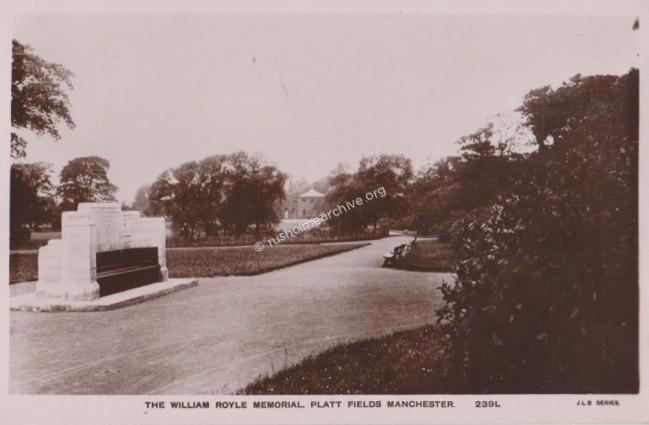
At the outset, I want to say that the most intimate aspects of William Royle’s life are taken from an excellent biography written by his daughter Dora in 1924. In the opening paragraphs she writes: "My father's life was exceptional in being spent entirely in one place, which in his childish days was still called a village. It is that fact which earned him the one title he most coveted and which he was proud to bear to the end – William Royle of Rusholme".
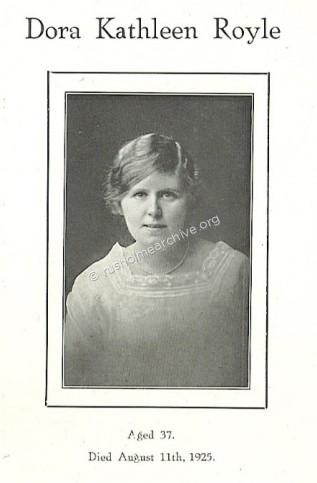
He was born in Rusholme on August 7th, I854, at a little house in Moor Street. There was only one other child living, a brother six years older, as two children died in infancy; he never had any sisters.
There was great economy in that home, and though poverty never became actual want, its shadow was always upon it, and from those days he dated his own deep interest in the poor. He would say in after life "It is easy for me to imagine how So and So is feeling, for I was brought up in a home like his".
When he was four years old he entered Birch Infant School, and was there for three years; then he attended Platt Day School which was held in the outbuildings of Platt Hall before it removed to Grove Street in l86l. His mother died in i860 and her husband survived her by about seven years.
In I865 Mr. Royle’s business career began, at the age of eleven, but within six months he was dismissed under rather amusing circumstances. He had been engaged as office boy to a Mr. Williams who did not agree with a habit young Royle had contracted, of gazing through the keyhole of a chiropodist in the same building cutting his clients toenails. He returned to school for another six months and was then engaged as office boy to Messrs. Albrecht & Co. of Aytoun Street. He earned 4 shillings, (20p) a week to begin with, and was with this firm for eight years. when he left Messrs. Albrecht he was twenty years old and earning £1 weekly. He offered himself to Messrs. Ellinger & Co. as manager of their print department; he was engaged and did that work for five years, only leaving when offered a better post with double salary at Messrs. Hudson & Co. He was there for five years, and then for twelve years until 1895 with Messrs. Galbraith & Co.
There were no trams in those days, though there were omnibuses. Consequently, many walked to work, timing themselves by Barnes clock at the corner of High Street (now, of course, Hathersage Road).
Miss Royle states that there was a strain of deep seriousness in her father’s character from his childhood, but one does not get a real glimpse of the part which religion was to play in his life until he was in his ’teens.
From babyhood he went to the Wesleyan Chapel in Dickenson Road until the last days of his life. He was a scholar in the infant school, then in the middle school, and finally a teacher; then becoming secretary and superintendent.
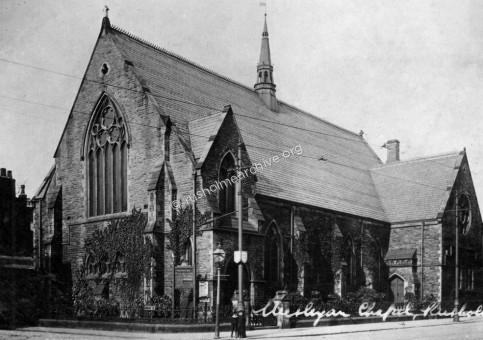
While in his ’teens Mr. Royle attended evening classes at Owens College, as it was then, in French and German. On Sundays he and a friend sat in different corners of a pew and studied, one a French and the other a German Bible during the reading of the lessons. Throughout his life he always impressed upon his children the great advantages which-they possessed over him in the matter of education.
At an impressionable age, be came under the influence of Mr. Thomas Lowe of the Wesleyan Chapel who gathered around him a band of young men and women, giving them a thorough grounding in the Old and New Testaments. Mr. Lowe formed these young people into a Mutual Improvement Society, and later on Mr. Royle felt qualified to read papers on different subjects, including "Unitarianism", "Eternal Punishment, "Jerusalem", "Our Indian Empire", "Poor Law and Poverty", and "Calico Printing". It was through Mr. Lowe's Influence that young Royle took up the cause of total abstinence in Rusholme. But his two main interests, apart from commerce, were to be religion and politics.
As mentioned earlier, Mr. Royle's mother died in i860, and three years afterwards he married a Miss Emily Turner whose family had been connected with the Wesleyan Chapel for many years. He wrote to his future father-in-law as follows "I know that I am asking for the very best of women. I have £100 in the bank and am earning £200 a year. Any plans we may make would have to include my old father who must of course live with us, but I know that Emily would agree to this".
They were married at the Wesleyan Chapel on September 18th, I883, before a very large congregation. He was early at the church and spent a profitable half hour before his bride arrived distributing leaflets for a special service to be held on the following Sunday.
He urged the congregation to be present and was so fully occupied that it was not until the bride and her father were at the chapel door that he suddenly realised that he had come there to be married.
There were four children of that marriage - three daughters and a son. I knew all of them, and Fred went to school at the same time as I did; the eldest and youngest daughters are still alive.
In l894 a serious lung trouble developed, and the medical opinion was that only immediate removal to a dry hot climate could save his life. The Canary Islands was recommended, but for some time there was no possible way of managing this. Finally, a lady who knew Mr. Royle through her husband in business came to see him and asked point blank if it was the question of money that was the worry. Mrs. Royle acknowledged it was, whereupon the visitor offered all money for the journey as a loan without interest, repayable whenever he felt able.
On his return from the Canaries, Mr. Royle was offered further promotion with the post of general manager to Messrs. N. P. Nathan's Sons. He remained with them until 1919 when he became a partner, a position which he held when he died four years later.
THE POLITICIAN
William Royle's political work lasted from 1866 onwards. His desire was to help his fellows and.to uplift the downtrodden. He would not have entered and remained in the political world if he had not felt this profoundly. He regarded this as a very real way of serving the Master he loved so well.
Until 1903 Mr. Royle's political work had been entirely in his own village. But in that year he was asked to be the Chairman of the Executive Committee of the newly formed Manchester Liberal Federation. He played a great part in the sweeping Liberal victories in Manchester in the 1906 General Election. He held the chairmanship for twenty years, and was consulted by Campbell Bannerman, Churchill, Lloyd George, Gordon Hewart, Mr. Asquith, and John Simon. Another personal was Arthur Henderson.
Mr, Royle's interest in municipal life was really greater than in national politics, as he felt that the best should be. given to the city in which he lived. He was frequently asked to stand for election, but steadfastly refused the invitation. Twice he was approached with a definite offer of knighthood, but each time the offer was not considered for a moment.
He was interested in the work of cleansing the moral life of Manchester, and in July 1903 was elected a member of the Committee of the Manchester and District Vigilance Association, and later was made Chairman and President.
It must be remembered that above all he was a Rusholme man, and never forgot that he had been a poor boy in the village. He was never happier than when doing something to improve it, and to leave it better for his efforts.
But his greatest achievement in this respect was the acquisition of Platt Fields as a public park forever. This is quite a romantic story and I do hope that some of you present know something about it. I could give you a long account of this but must be brief. In 1901 the grand-daughter of Charles Carill-Worsley tried to sell Platt Fields, but failed, she tried again in 1906 before her marriage in the following year. In the summer of 1907 Mr. Royle first heard of the certainty that the front portion of the Platt estate was sold to a builder for the purpose of erecting shops.
He wrote a strong letter to the press headed "A Pathetic Appeal"; also he asked the gentleman who had bought the land to come and see him, and pleaded with him to sell it again as he thought he could raise the money from public-spirited citizens. The gentleman came and he agreed to sell back the portion of the estate required. He was a complete stranger to the family, and Miss Dora Royle tells us that afterwards he frankly confessed that it was her father’s intense and unselfish interest in the matter that weighed most with him in making his decision.
In the meantime, Mr. Royle had flooded the neighbourhood with leaflets. At his request, a Town's Meeting was called by the Lord Mayor. This was an unusual and bold step as the requisite number of citizens had not requested it. When the meeting was held in the Town Hall, he had most thoroughly packed it with Rusholmites, so that there would be no doubt as to the result. A resolution was passed recommending the City Council to purchase Platt Fields as a park for public use. Platt Fields was formally opened by the Lord Mayor, Councillor Behrens, on May 7th, 1910.
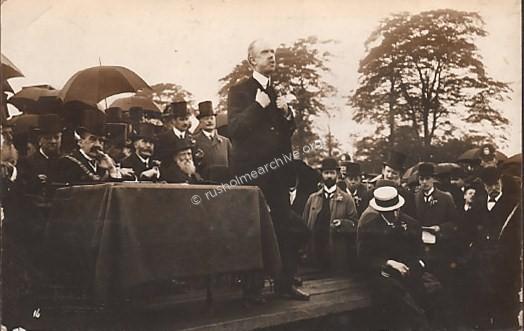
I came across the following one day when I was in the Local History Library. It was printed for Mr. Royle. "This little souvenir is issued to my friends in Rusholme when Platt Fields is opened to the public. In the years that are to come, little children may play, aged people may rest, and all of us, at this beautiful shrine of nature, may worship our common creator". What prophetic words those were.
A pleasant by-path into which his love for the village led him was the writing of a "History of Rusholme". This originated in a lecture delivered in 190*+ at the Rusholme Public Hall entitled "Fifty Years in Rusholme". The lecture took many months of preparation, and he helped It by having a large number of lantern slides prepared. It was with difficulty that he was persuaded to take the Public Hall for the lecture, but on the actual night of the event, the hall was crowded to the doors. He had to repeat the lecture five times in the next fortnight.
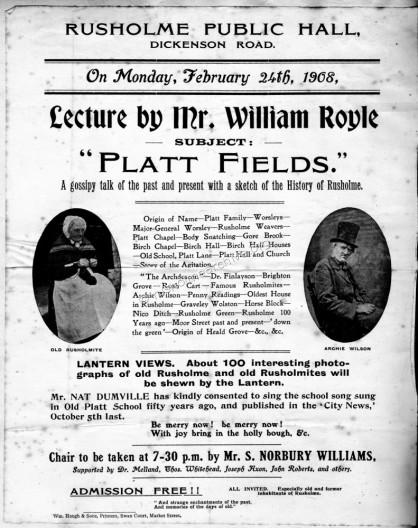
This lecture was unique. I am quite aware that this word is often misused, but really no other word can describe the event. In 190k I was much too young to take any interest in these happenings.
I had not yet myself got immersed in Old Rusholme and Mr. Royle. That was to come later. As a result, I did not hear the talk until I was demobilised after World War 1. On reflection, I feel sure that this might have been the very last time that he gave the lecture. I have never forgotten the occasion. He read old Lancashire dialect poems, sang old songs, and constantly interrupted the proceedings with quaint stories of Rusholme worthies. On this particular evening, another well-known Manchester man was present. .1 refer to Mr. Norbury Williams. All of a sudden Mr. Royle invited him on to the platform and more or less compelled him to join in singing a duet which was "where are the boys of the old brigade?"
THE LOVER OF MEN
It is said, by those who knew Mr. Royle intimately, that his character never changed. In the little boy living in that back street, in the conscientious youth learning his business, in the eager young man helping in social work, and later, in the ardent politician, there were the same essential traits of his nature.
His love for children was very pronounced, and in his walks round Rusholme on Saturday afternoons, he spent half his time with the children. Whit Week, with its arrangements for the young, was easily his favourite in the year, and on Whit Sunday he headed a long procession of scholars and teachers from the Wesleyan Sunday School to Union Chapel, opposite Whitworth Park.
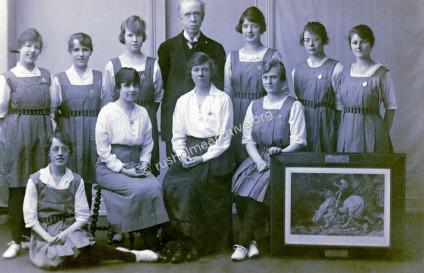
One bitter December night in 191^ he was waiting on the station platform for the London train to bring a homeless Belgian family to live in Dickenson Road. They did not speak English, and he knew neither Flemish nor French, but as the tired and dispirited family arrived, he sprang forward to grasp them by the hand, and his smile was enough! I think you will be interested to know that this family of refugees was accommodated in the house next door to ours.
THE LOVER OF GOD
Through all his life William Royle was first and foremost a great Christian and was never concerned about the exact form of Christianity which a man professed. However, .it would be unfair to the Church which nurtured him to deny that he was primarily a Wesleyan Methodist. For many years he preached on the second Sunday in every month at the. McLaren Memorial People’s Institute in Eileen Grove.:
His religious life might be summed up in that blessing and that promise made by the Saviour on the Mount. Blessed was he, for he was pure in heart. Throughout his life he earned the promised reward, and he saw God.
THE LATTER YEARS
The family were travelling in Scotland when the First World War broke out. A month later his son Fred enlisted, and soon received a commission. In November, 1915 Fred being now a Captain in the 19th Battalion of the Manchester Regiment crossed the Channel, and was stationed on the Somme.
The strain of war-time conditions and an illness of long standing told upon Mrs. Royle, and after two operations she died on June 6th, 1916, in the presence of her husband and son, Fred having arrived home quite unexpectedly just a few days before.
The Manchester Guardian, 7th June 1916
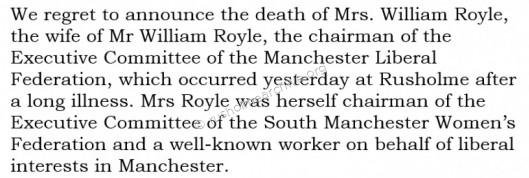
Mr. Royle and family went to Llandudno immediately after the funeral. But that family circle was broken beyond repair. Mr. Royle's eldest daughter had married in April 1916, and sailed for India; his wife died in June, and in July he said goodbye at Llandudno to his son, whose extended leave was finished, and who had to return to prepare for the Somme advance.
On July 12th Mr. Royle received the telegram that turned his day into night. Fred had died on the previous Saturday of wounds received in action in the early hours of the morning. This crushing blow followed so quickly after Mrs. Royle's death that he was still answering letters of condolence.
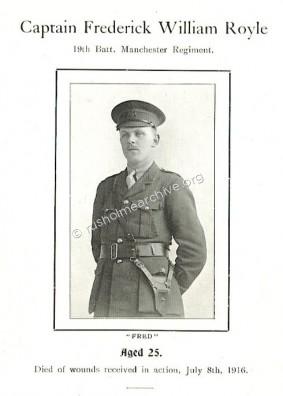
We now jump to the year 1919 when William Royle became a partner in the firm which he had served since 1895. His youngest daughter's wedding took place in the autumn of 1920, and, although he had been very ill, he took part in the family festivities. *In September he had an operation which could not be completed, and five weeks later he left the nursing home to try and gain strength in North Wales for another operation. And it was here, stricken but indomitable, that he received a flying visit from the Prime Minister, Mr. Lloyd George.
*Harold Grayson’s recollection of this event is not correct, according to the Manchester Guardian Lloyd George visited William Royle in 1922. The operation was on the 17th Sept and Lloyd George visited WR October 14th.
‘Mr. William Royle, one of the Premier's old political friends, but now the leader of Manchester Liberal Federation, has just under-gone a serious operation, and is lying in the Elmfield Nursing Home, Victoria Park. The Premier called at the nursing home, and for a few moments chatted with Mr; Royle, telling him that though they sometimes differed on political questions his personal regard, and friendship for Mr. Royle had not diminished.’
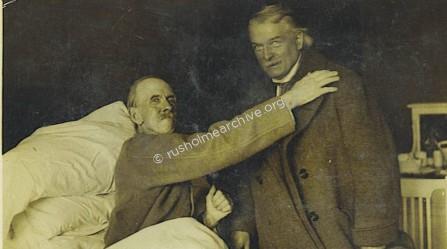
Below is a photograph of Elmfield, the nursing home on Anson Road.
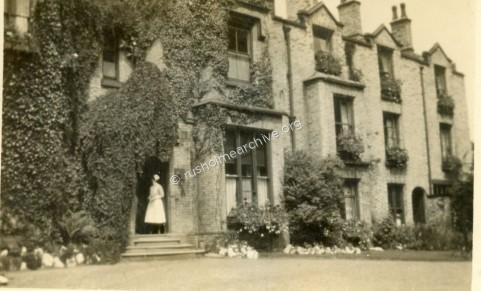
That winter was spent in Colwyn Bay and he returned to his beloved Rusholme in April 1923 to complete the operation, which took place on May 30th, and five days later he died. He was buried in Birch churchyard on the following Saturday afternoon, June 9th. This was the most impressive funeral that I have ever seen, and I shall never forget the occasion.
PERSONAL
Before closing I would like to say a few things of a personal nature. I first got to know the Royle family at the beginning of the century when I delivered groceries to their house in Birch Polygon, which in those days was very "posh". Fred and I used to go to school together through Victoria Park, though to different institutions. The eldest daughter is still living, now in Victoria, British Columbia.
I believe her younger sister is now living very quietly in retirement. Mrs. Stocker is the name of the eldest daughter, and at the beginning of 1970 we were in correspondence together. Actually, I did not have close connections with Mr. Royle until after 1919. Ply own sister knew him much better as she was a member of his Sunday School class, and she will never forget that privilege and experience.
Mr. Royle amassed quite a considerable fortune, especially when one considers the time and period in which he lived. You may be interested to know that he left a bequest of £300, the interest of which was to be used to provide poor widows and families with gifts at Christmas time. This was administered by trustees, but eventually in October 1962 a new scheme was instituted by the Charity Commissioners. I was asked to be the first secretary of this new scheme and was appointed a trustee for a term of five years, an appointment which has already been renewed for another five-year period.
When Miss Dora Royle was breaking up the old home she asked Alderman Barlow's advice as to what might be done regarding the lantern slides which her father used in the lecture. Mr. Barlow
consulted me, and we decided to hand these over to the Central Library. Most unfortunately, they were inadequately titled, but eventually I was able to do something about this. I think it can be said that from that time I really became interested in Old Rusholme, and especially in William Royle.
If any of you stroll around Birch, I do hope you will seek out the grave of the Royle family and then offer up a prayer of thankfulness for a life spent in the interest of his fellowmen. On the gravestone there is a text, relating to Fred, which reads: "And He delivered him to his mother".
William Royle was a model of good citizenship. He gloried in the fact that he was a citizen of Manchester - no mean city in his eyes. His chief aim in life was helpfulness, for which he wanted no reward. The most modest of men, he was none the less so exalted, in his sense of what was right and honourable, that he seemed to be of higher stature than the majority. He and others who inaugurated schemes in Rusholme were doing bigger things than they realised and were sending out a stream of civic energy and enterprise. "They laboured and we have entered into their labours".
I have already mentioned that Mr. Royle twice refused a knighthood and as a result never became Sir William Royle, preferring to be known as William Royle of Rusholme. But I like to think, and I hope that you will agree, that a truer title would be Saint William of Rusholme. That is my own personal tribute to a remarkable man.
I would like to quote some more words of Thomas Carlyle before closing. "Why is the past so beautiful?" he asks, and then answers his own question. "The element of fear is withdrawn from it for one thing. That is safe, while the present and the future are all so dangerous".
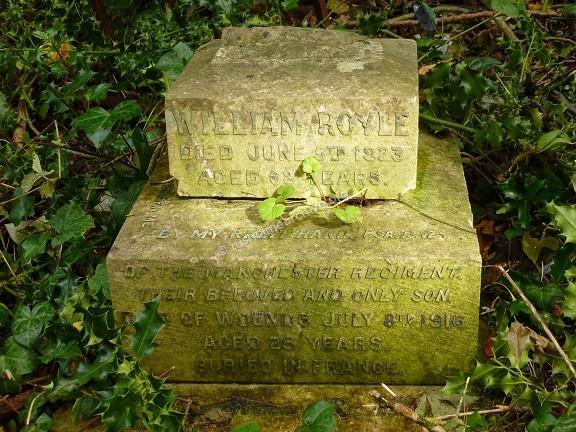
The Manchester Guardian published a long obituary for William Royle. You can download a pdf copy here.
